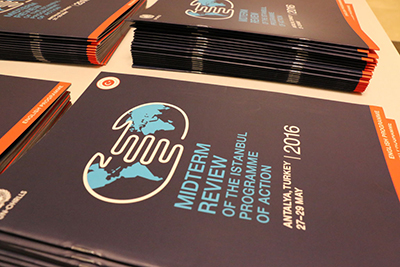States seize opportunity to accelerate action on gender equality and women’s empowerment in poorest countries
Date:
To strengthen the partnership and path to development for the world’s 48 poorest countries, representatives from Governments, the UN system, civil society and the private sector are gathering in Antalya, Turkey from 27-29 May 2016, to undertake a Comprehensive High-level Midterm Review of the Istanbul Programme of Action (IPoA) for the Least Developed Countries, to accelerate action on its implementation from here until 2020.

Adopted in 2011, the IPoA has a dedicated priority area on gender equality and women’s empowerment, which outlines a comprehensive set of actions for Least Developed Countries and their development partners (see conceptual brief). UN Women sees the Midterm Review as an opportunity to set more ambitious commitments towards achieving gender equality and women’s empowerment in these countries and to create strong synergies with the 2030 Agenda for Sustainable Development, for accelerated achievement of its goals.
On the eve of the Review, a private sector forum took place on 26 May, as well as a Ministerial Pre-Conference forum on “Building quality human capital for economic transformation and sustainable development in the context of the Istanbul Programme of Action”, organized by UNFPA and UN-OHRLLS in partnership with the Governments of Bangladesh and Turkey. In its contribution to the panel on Place and Mobility for the socioeconomic advancement of Least Developed Countries, UN Women highlighted key strategies for addressing the drivers of inequality for women and girls and for creating a conducive environment to unleash women’s and girls’ full potential.
On 28 May, UN Women Deputy Executive Director Lakshmi Puri will speak as a panelist on the third of four thematic roundtables, entitled “Human and social development and good governance at all levels” (see programme). She will reflect on progress made and what can be done to ensure that the second half of the Programme of Action is implemented with women and girls front-and-centre, and in alignment with the 2030 Agenda for Sustainable Development and its Goal 5 on gender equality. Noting that women in Least Developed Countries are less likely to participate in formal labour markets and are over represented in vulnerable, low-paid, unvalued and informal jobs than in more developed countries, she will stress the need to pursue a more holistic approach to policy and legal change, track investments in gender equality and women’s empowerment, and secure transformative financing. Ms. Puri will also participate in the general exchange of views showcasing UN Women’s support for LDCs.
Also on 28 May, UN Women Representative in Liberia, Awa Ndiaye-Seck, will moderate a side event co-organized by UN Women and UNIDO, entitled “Enhancing productive capacities of women and youth through multi-stakeholder partnerships” (see programme), and will highlight UN Women’s experiences in supporting women entrepreneurs. UNIDO will launch its new Inclusive Development and Entrepreneurship for All (IDEA) programme. Smriti Thapa, a young woman activist from Nepal, will offer insights on how her generation is helping to galvanize gender-responsive development.
The Midterm Review will conclude with the adoption of a political declaration in which Member States will acknowledge, among other things, that further efforts are needed to remove various barriers that hinder the achievement of gender equality and the empowerment of women at many levels. In a forward-looking set of recommendations covering key areas of concern for this group of countries, Member States will highlight commitments to gender equality and the empowerment of women and girls in a range of priority areas, including to:
- Work towards significantly increasing investments to close the gender gap and strengthen support for institutions;
- Make further progress in ensuring gender balance in enrolment in and completion of secondary and tertiary education;
- take all measures to ensure that women have a role in peacebuilding and State-building;
- put in place gender-responsive policies and actions to address crises and disasters, including through ensuring women’s full, equal and effective participation and leadership in decision-making;
- empower women in agriculture, including through women’s access to and control over land and other productive assets; and
- encourage national statistical capacities in Least Developed Countries to be strengthened in order to increase the use and availability of high-quality and reliable data disaggregated by sex and other characteristics necessary for efficient policymaking and effective follow-up.
See the full programme for the Midterm Review. Read this conceptual brief on gender equality and the IPoA.